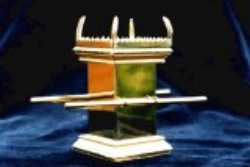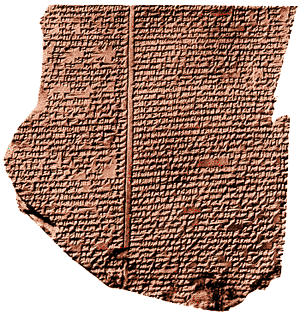|
BACKGROUND
The background to this teaching is found in the book 'Eagles Fly High!'.
DOWNLOADABLE HERE
|
Online links to scriptures (New International Version [NIV] unless otherwise stated) are shown in blue
| NEW TESTAMENT REVELATION ON ATONEMENT
THE BOOK OF HEBREWS (Continued) |
|
|
| 3. The Sacrificial Work of our High Priest is Superior: (Hebrews 8:1-10:39) |
|
 The New Covenant is immeasurably superior to the Old, The New Covenant is immeasurably superior to the Old,
“But the ministry Jesus has received is as superior to theirs as the covenant of which he is mediator is superior to the old one, and it is founded on better promises.†(8:6)
for it is internally based, of the heart, not external, as was the law.
“This is the covenant I will make with the house of Israel after that time, declares the Lord. I will put the laws in their minds and write them on their hearts, I will be their God, and they will be my people.†(8:10)
Sins are to be forgiven and forgotten.
“For I will forgive their wickedness and will remember their sins no more.†(8:12)
Hebrews 8:1-13
|
|
|
 b. A Better Sanctuary: (9:1-12) b. A Better Sanctuary: (9:1-12)
In a deliberate New Testament interpretation, the Golden Altar of Incense was placed in the Most Holy Place, whereas in the tabernacle itself it was in the Holy Place.
“Behind the second curtain was a room called the Most Holy Place, which had the golden altar of incense and the gold-covered ark of the covenant.†(9:3-4)
The first Tabernacle was limited in its effectiveness.
“But only the high priest entered the inner room, and that only once a year, and never without blood, which he offered for himself and for the sins the people had committed in ignorance. The Holy Spirit was showing by this that the way into the Most Holy Place had not yet been disclosed as long as the first Tabernacle was still standing.†(9:7-8)
but Jesus opened the Holy of Holies up to us.
“He did not enter by the means of goats and calves; but he entered the Most Holy Place once for all by his own blood, having obtained eternal redemption.†(9:12)
Hebrews 9:1-12
|
|
|
 c. A Better Sacrifice: (9:13-10:18) c. A Better Sacrifice: (9:13-10:18)
God’s absolute principle of requiring a blood sacrifice for the forgiveness of sin remains the same,
“In fact, the law requires that nearly everything be cleansed with blood, and without the shedding of blood there is no forgiveness.†(9:22)
but the means of achieving the required sacrifice has changed.
“so Christ was sacrificed once to take away the sins of many people; and he will appear a second time, not to bear sin, but to bring salvation to those who are waiting for him.†(9:28)
Hallelujah! Jesus, through His obedience made us (positionally) holy.
“Then he said, “Here I am, I have come to do your will. He sets aside the first to establish the second. And by that will, we have been made holy through the sacrifice of the body of Jesus Christ once for all.†(10:9-10)
In order to personally experience holiness in our lives we have to follow the example of Jesus and set aside our will for His.
“because by one sacrifice he has made perfect forever those who are being made holy.†(10:14)
Yes, personal holiness comes through the submission of our will to that of God the Father, as the example of Jesus testifies.
Hebrews 9:13-10:18
|
|
|
 d. A Call to Persevere: (10:19-38) d. A Call to Persevere: (10:19-38)
We are to be purified by the water.
“let us draw near to God with a sincere heart in full assurance of faith, having our hearts sprinkled to cleanse us from a guilty conscience and having our bodies washed with pure water.†(10:22)
There are dire consequences awaiting us if we don’t,
“If we deliberately keep on sinning after we have received the knowledge of the truth, no sacrifice for sins is left, but only a fearful expectation of judgement and of raging fire that will consume the enemies of God.†(10:26-27)
for God will avenge those who abuse His grace.
“How much more severely do you think a man deserves to be punished who has trampled the Son of God underfoot, who has treated as an unholy thing the blood of the covenant that sanctified him, and who has insulted the Spirit of grace? For we know him who said, “It is mine to avenge; I will repay,†and again, “the Lord will judge his people.†It is a dreadful thing to fall into the hands of the living God.†(10:29-31)
But we will be rewarded for our perseverance.
“So do not throw away your confidence; it will be richly rewarded. You need to persevere so that when you have done the will of God, you will receive what he has promised.†(10:35-36)
Hebrews 10:19-39
|
| 4. A Final Plea for Perseverance in the Faith: (Hebrews 11:1-12:29) |
|
 a. Perseverance by Faith: (11:1-40) a. Perseverance by Faith: (11:1-40)
“Now faith is being sure of what we hope for and certain of what we do not see. This is what the ancients were commended for.†(11:1-2)
Numerous examples of the forefathers’ faith from Abel to Rahab are testified to. Yet their well-earned reward will only be received along with ours.
“These were all commended for their faith, yet none of them received what had been promised. God had planned something better for us so that only together with us would they be made perfect.†(11:40)
Hebrews 11:1-40
|
|
|
 b. God Disciplines His Sons: (12:1-13) b. God Disciplines His Sons: (12:1-13)
Following the example of the ancient believers we are to persevere in our race,
“Let us fix our eyes upon Jesus, the author and perfecter of our faith, who for the joy set before him endured the cross, scorning its shame, and sat down at the right hand of the throne of God.†(12:2)
enduring the hardship of God’s disciplining of us as sons.
“Our fathers disciplined us for a little while as they thought best; but God disciplines us for our good, that we may share in his holiness. No discipline seems pleasant at the time, but painful. Later on, however, it produces a harvest of righteousness and peace for those who have been trained by it.†(12:10-11)
Hebrews 12:1-13
|
|
|
c. Warning Against Refusing God: (12:14-28)
Peacefulness and holiness is required of us.
“Make every effort to live in peace with all men and to be holy; without holiness no one will see the Lord.†(12:14)
We are to receive a heavenly kingdom, but that comes with responsibilities.
“Therefore, since we are receiving a kingdom that cannot be shaken, let us be thankful, and so worship God acceptably with reverence and awe, for our God is a consuming fire.†(12:28-29)
Hebrews 12:14-29
|
| 5. Concluding Exhortations: (Hebrews 13:1-25) |
|
 a. Practical rules for Christian Living: (13:1-17) a. Practical rules for Christian Living: (13:1-17)
A list of practical guidelines relating to hospitality, prisoners, marriage, love of money, leadership, strange doctrines, food, and submission, remembering that
“Jesus Christ is the same yesterday and today and forever.†(13:8)
Hebrews 13:1-17
|
|
|
b. Personal Matters: (13:18-25)
Even here, an exhortation to go on to maturity and not fall away, the twin themes of this letter.
“Brothers, I urge you to bear with my word of exhortation, for I have written you only a short letter.†(13:22)
Hebrews 13:18-25
|
| <i>NEXT WEEK:</i> BEYOND THE VEIL – 2 NEW TESTAMENT REVELATION ON ATONEMENT THE BOOK OF HEBREWS concludes |
|
 As we look at a vital and enlightening difference between the Old and New Testaments, and conclude our study with a summation of what we have learned. As we look at a vital and enlightening difference between the Old and New Testaments, and conclude our study with a summation of what we have learned.
|
| A NOTE FROM DAVID |
|
 Much of the teaching of Hebrews appears harsh and out of line with the rest of the New Testament. Much of the teaching of Hebrews appears harsh and out of line with the rest of the New Testament.
However, the book is written for mature Christians, and reminds us that we have responsibilities in Jesus as well as blessings.
We ignore this at our peril, as the writer warns.
Ancient Babylonia - Hammurapi of Babylon
The remainder of the Old Babylonian Period (1763-1595 BC) was characterized by a shift of power in the north with Hammurapi of Babylon (1792-1750 BC) as the main figure. Hammurapi was the sixth king of the first dynasty of Babylon. During his reign he dealt with his enemies through diplomacy or military force. His main rivals consisted of Larsa, Eshunna, Mari and Shamshi-Adad I of Assyria (1813-1781 BC).
Hammurapi was so successful that at his death the first dynasty at Babylon claimed suzerainty over the whole Babylonian plain even to the regions in the north as far as Mari and Ashur.
Recent discoveries at Mari in the 1930s revealed the political intricacies of the Hammurapi age. Archaeologists have discovered a vast archive of cuneiform tablets. Most of these tablets were letters and business documents, revealing interesting details about the maneuvers of Hammurapi and his enemies. Some revealed that, Hammurapi's ambassadors resided in Mari while Mari's ambassadors resided in Hammurapi's court, both spying on activities and bringing back reports to their respective kings.
For the most part Mari and Babylon had a friendly relationship but, when Hammurapi had finally conquered Rim-Sin of Larsa, he turned on his old ally at Mari and conquered the city-state to expand his empire.
|
So until next week.......
MAY GOD BLESS YOU AND YOU BLESS GOD!
His servant and yours

Learn more about us at...
www.wwj.org.nz/about.php
|
A DAVID'S DOODLING
1077. Believing is free, discipleship costs your life.
David Tait
|
Check
out the WWJ website for….
More David's Doodlings: www.wwj.org.nz/dd.php
Facts for Fun: http://www.wwj.org.nz/facts.php
Marriage and Family Facts: http://www.wwj.org.nz/maffacts.php
Just jokes: http://www.wwj.org.nz/jokes.php
Waxing Lyrical: http://www.wwj.org.nz/waxing.php
|

 The New Covenant is immeasurably superior to the Old,
The New Covenant is immeasurably superior to the Old, b. A Better Sanctuary: (9:1-12)
b. A Better Sanctuary: (9:1-12) c. A Better Sacrifice: (9:13-10:18)
c. A Better Sacrifice: (9:13-10:18) d. A Call to Persevere: (10:19-38)
d. A Call to Persevere: (10:19-38) a. Perseverance by Faith: (11:1-40)
a. Perseverance by Faith: (11:1-40) b. God Disciplines His Sons: (12:1-13)
b. God Disciplines His Sons: (12:1-13) a. Practical rules for Christian Living: (13:1-17)
a. Practical rules for Christian Living: (13:1-17) As we look at a vital and enlightening difference between the Old and New Testaments, and conclude our study with a summation of what we have learned.
As we look at a vital and enlightening difference between the Old and New Testaments, and conclude our study with a summation of what we have learned.  Much of the teaching of Hebrews appears harsh and out of line with the rest of the New Testament.
Much of the teaching of Hebrews appears harsh and out of line with the rest of the New Testament.